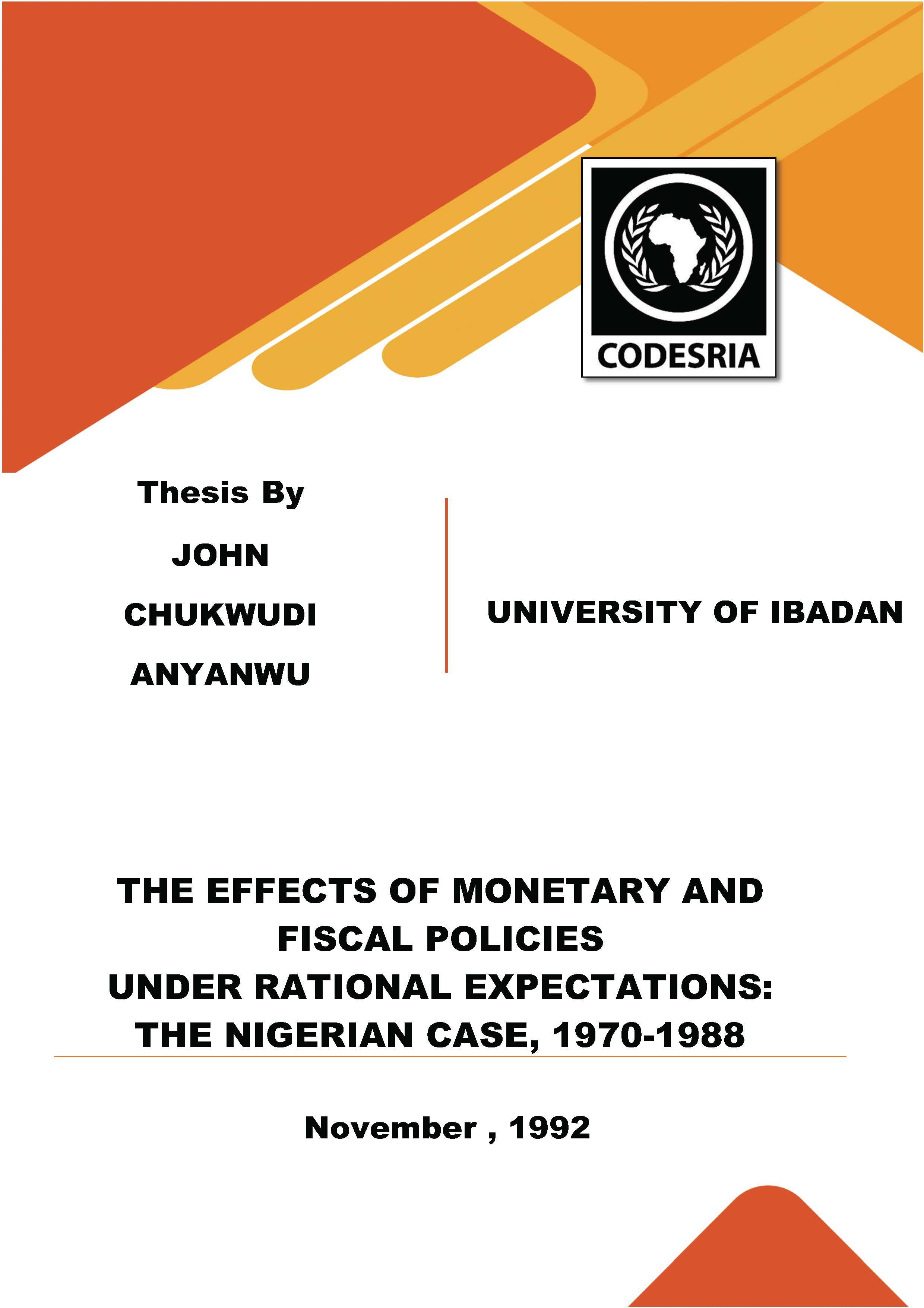The effects of monetary and fiscal policies under rational expectations : the Nigerian case 1970-1988
Keywords:
Monetary Policy, tax policy, macroeconomics, economic policy, economic implicationsSynopsis
THE EFFECTS OF MONETARY AND FISCAL POLICIES UNDER RATIONAL EXPECTATIONS: THE NIGERIAN CASE, 1970-1988 JOHN CHUKWUDI ANYANWU The proposition of the rational expectations school is that systematic aggregate demand policy does not affect real economic variables (output and ~nemployment) in the short-run, (the policy ineffectiveness proposition or PIP), but affects prices, while only random changes in aggregate demand affects the level of real economic variables. In other words, no government macroeconomic policy whether monetary or fiscal, no matter how ingeniously forrnulated and how effectively implemented, can have any systematic or lasting impac~ upon real economic variables. This seriously questions the Keyriesianinterventionist demand management philosophy, thus asserting that the attempt at stabilization policy by systematic demand management strategy will become predictable and once predictable wil·l be negated in. their · impact by rational utility maximizing agents. Only random policy shifts in aggregate demand will affect real variables and such random actions are unlikely to move the economy closer to declared policy goals. The proposition has been extensively tested using overseas data but, with the exception of the Uba (1989') and Odedokun (1988a, 1989) studies, has received little empirical attention in Nigeria. In addition, none of these Nigerian studies incorporates effects on unemployment as well as the importance of an openeconomy, In this study, given the persistence of inflation with recession (and high unemployment) in Nigeria, we subjected the proposition to econometric tests using Nigerian annual data from 1970 .to 1988. Indeed, the new classical macroeconomics provides an attractive theoretical underpinning for the notion that the short-run output (and unemployment) effects
of restrictive demand-managemènt policies associated with stabilization programmes in developing countries are less adverse than is commonly supposed. This provided an added fillip for the study, to establish the empirical relevance in a developing economy of the policy ineffectiveness proposition associated with this school of thought.
Downloads
References
Ackley, G. (1978) ,,Macroeconomiis Theory and Policy Callier - Mâcmillan, Hong Kong.
Adeyoktmnu ., T. and Ladipo, o.o. (1982), "The causes of Inflation in Nigeria: Quantita~ive Assessment," in Onitiri, H.M.A. and Awosika,K. 1eds), Inflation in Nigeria: Providin 0f.a National Conference, NISER, I a an, pp.
Ajayi, S.I. (1978~ ''The Money Multiplier and Monetary Control", in Teriba, O. and ·niejomaoh, V.P. (eds), Money, Finance and Nigerian Economie Development: Essays in Honour of Obasanmi Olakapo, Nigerian Economie Society, Ibadan, pp. 42-72.
Ajayi, S.I. (1978b), Money in a Develping EconomY: a portfolio approaen·-to money supply determination
in Nigeria, Ibadan University ~res~, Ibadan: Ajayi, S.I. (1974) "An Econometric Case Study of the Relative Importance of Monetary and Fiscal Policy in Nigeria", The,~angladesh Economie Review.
Ajayi, S.I. (1978), "Money, Prices and Interest: The Nigerian Paradigm", irh'e Nigerian Journal
of Economie and Social Studies, Vol. 20 No. 2, July 1978, pp. 175-194.
Ajayi, S .I. (1983), "On the Directional...Between Money and , the. Nigerian Journal of Economie and Social-Studies,
Vol. 25, No. 3, November, l983, pp. 319-326, Ajayi, S .I. and Awosika, K. (1980), Inflation in Nigeria: Domestic or Imported? Commissioned Paper for PPIB, January, pp. 1-51.
Ajayi, S.I. and Ojo, o.o. (1981), Money and Banking: Analysis of Policy in the Nigerian Context, George Allen and Unwin, London, p. 230.






